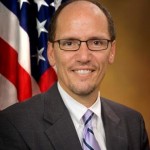Arizona’s Big Mistake
 Arizona recently passed into law provisions that make a person’s illegal presence in the state of Arizona — currently a civil violation under federal law — a crime under state law. The Arizona law also provides for the arrest of persons where the police have a “reasonable suspicion” that the individual is unlawfully present and where the individual cannot produce the proper documentation. Last minute changes were made to the law this past Friday in order to prohibit the use of racial or ethnic profiling by police in determining who to stop and question, and to clarify that questions about an individual’s immigration status should only be asked as part of an investigation of non-immigration related violations. These changes to the original language were made to try and stave off several threatened lawsuits intended to challenge the constitutionality of the Arizona law.
Arizona recently passed into law provisions that make a person’s illegal presence in the state of Arizona — currently a civil violation under federal law — a crime under state law. The Arizona law also provides for the arrest of persons where the police have a “reasonable suspicion” that the individual is unlawfully present and where the individual cannot produce the proper documentation. Last minute changes were made to the law this past Friday in order to prohibit the use of racial or ethnic profiling by police in determining who to stop and question, and to clarify that questions about an individual’s immigration status should only be asked as part of an investigation of non-immigration related violations. These changes to the original language were made to try and stave off several threatened lawsuits intended to challenge the constitutionality of the Arizona law.
These changes to the law may diminish the likelihood that the Arizona state statute will be found to violate the Fourth Amendment and the Equal Protection Clause. However, the most likely ground for a ruling that the Arizona law violates the Constitution was, and remains, that any state attempt to regulate the border is preempted by the pervasive scheme of federal immigration legislation. While many observers will anxiously await the outcome of these constitutional challenges, it is important to recognize that there is a separate and more fundamental reason why the Arizona law is a mistake. The law perpetuates a trend by our elected officials, identified by Professor Jennifer Chacon and others, that mistakenly conflates the criminal law with immigration law. The convergence between these two separate areas of the law began in the 1990s and gathered momentum after September 11, 2001. This process needs to be stopped and reversed.

